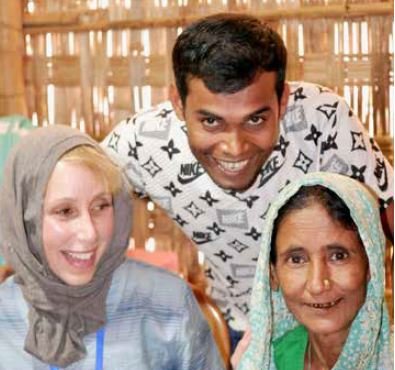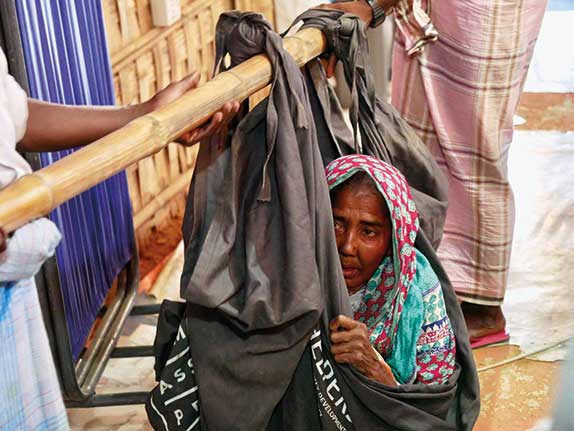
Working with Rohingya Refugees: Karen Arnold (MD’85)
By Chris Benjamin for Dal Magazine | Photo above: Dr. Karen Arnold (L) with a translator (centre) and patient (Ruth Kaiser photo)
After a week in the Rohingya Refugee Camp in Bangladesh, where a million people live after having fled ethnic cleansing in Myanmar, Karen Arnold (MD’85) had developed an uncanny skill. She could tell without asking how long her patients had been in the camp, by how malnourished they were.
“They aren’t allowed to work or receive education,” she recalls. “They couldn’t receive anything from volunteers but medical care. They were provided 25 kilograms of rice per month per family, and occasionally lentils.”
Dr. Arnold, despite her growing awareness of the enormity of the refugees’ challenges, had to focus on the immediate task of providing treatment as part of a team that included a Bangladeshi physician, a Canadian pediatrician, an American logistician and paramedic, and three family physicians from Canada, the US and Spain, as well as a photographer. Together they treated 300 people per day, some who walked two hours for assistance.
 Dr. Arnold was a long way from her practice as a family doctor in Vancouver. There, she’s worked for more than a dozen years in the Downtown Community Health Centre, “a multidisciplinary clinic treating people suffering from trauma, addictions, HIV and mental health challenges” in the Downtown East Side. It’s fulfilling work serving vulnerable populations, including homeless people, and using a progressive, harm-reduction model. But she’d long wanted to volunteer internationally, and in November 2018 she found MedGlobal (medglobal.org), an organization committed to “a world without health-care disparity” that was urgently seeking a family physician. MedGlobal accepted her for a week-long placement at the Rohingya camp, which allowed her to fit the volunteer time with her continuing work and family commitments in Vancouver.
Dr. Arnold was a long way from her practice as a family doctor in Vancouver. There, she’s worked for more than a dozen years in the Downtown Community Health Centre, “a multidisciplinary clinic treating people suffering from trauma, addictions, HIV and mental health challenges” in the Downtown East Side. It’s fulfilling work serving vulnerable populations, including homeless people, and using a progressive, harm-reduction model. But she’d long wanted to volunteer internationally, and in November 2018 she found MedGlobal (medglobal.org), an organization committed to “a world without health-care disparity” that was urgently seeking a family physician. MedGlobal accepted her for a week-long placement at the Rohingya camp, which allowed her to fit the volunteer time with her continuing work and family commitments in Vancouver.
She read all she could about the Rohingya, but the news articles did not prepare her for the struggles the refugees face. “My life has been changed completely because of witnessing this,” she says. “Just getting a glimpse.” As she treated rashes, coughs, and fevers, Dr. Arnold—who has worked in mental health as well—was weighted by the knowledge that the trauma her patients experienced would have life-long impacts. She met many young women who were already widows. “I heard horrific stories every single day,” she says. “People stayed dignified, incredibly resilient. They were doing their best.”
Dr. Arnold returned to Bangladesh with MedGlobal in June as part of a team teaching a course to 200 local physicians and midwives, including 36 who will become trainers themselves, on neonatal resuscitation in resource-poor environments. More than 60 babies are born in the camp daily—16,000 between May 2018 and March 2019—in structures made with bamboo poles and tarps. Neonatal mortality rates are extremely high. “It is one concrete thing that can be helpful,” she says.